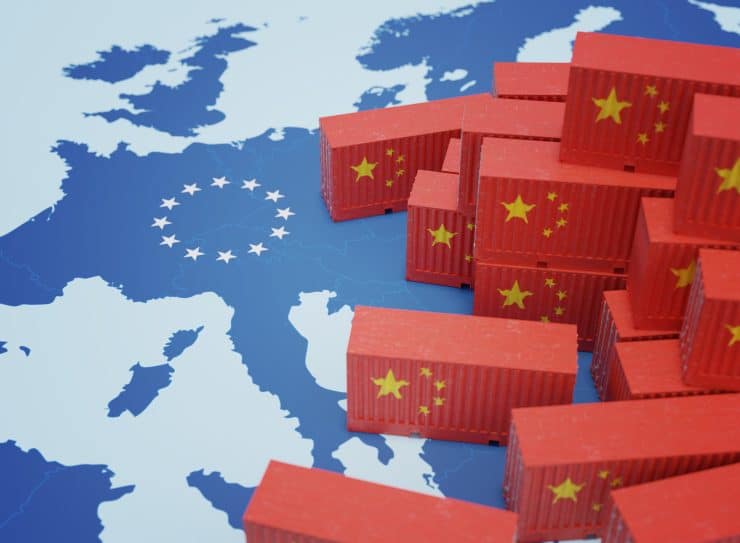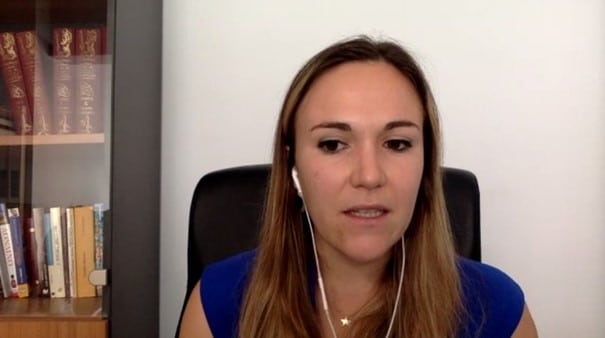11 April 2022
On The Agenda: EU-China, A Partnership to Redefine – Main Takeaways
This edition of ‘On The Agenda’, focused on the EU-China relationship in light of the April 2022 Summit.

This edition of ‘On The Agenda’, focused on the EU-China relationship in light of the April 2022 Summit.

On the Agenda: EU-China, a partnership to redefine long-term vision for today’s challenges took place on 7 April via Zoom. The webinar event brought together experts on EU-China relations and created a space for insightful discussions on defining the the current relationship and necessary steps for the future.
The welcomed speakers, Laia Comerma Calatayud, PhD researcher from Barcelona Institute for International Studies and Francesca Ghiretti, Analyst at Mercator Institute for China Studies, addressed the most critical issues surrounding the relationship and corresponding influence. Given the overarching presence of the Russian war in Ukraine, there was also a signifcant focus on the EU’s role in China-Russia relations. The discussions were moderated by by Doctor Antonios Nestoras, Head of Policy and Research, European Liberal Forum.
The event opened with a message from Hilde Vautmans, Member of the European Parliament form Renew Europe Group and President of European Liberal Forum. Her welcoming remarks set the tone for the discussion, as she mentioned the importance of the EU-China relationship and the recent Summit, emphasising a lack of common understanding. She stated that, “China is too big to be ignored” especially when it comes to finding responses to global challenges. Yet a lot of work on this partnership still needs to be done as “each time we see that our fundamental values are in direct opposition to China”.
The discussion then passed back to the speakers who spoke to these points.
The main takeaways were that both parties need to develop a better understanding of the other. We live in contrasting systems but we are linked with many common interests, which makes for a very challenging relationship.
Francesca Ghiretti stated that,
“China needs EU and EU needs China”.
Despite of shared interests we need to consider the specifics of the partnership, as it now goes beyond common economic agendas. The discussion underlined that “China likes their system, so they are playing pick and chose to the Western one, taking the advantages where it favours it”. This lead to a consensus between both speakers that a redefinition of this partnership-rival relationship is crucial for moving forward, yet the understanding of it is completely different for both sides of the conversation and the EU must try to view the definition through the eyes of China.

The issue is especially prevalent now, in the context of the war in Ukraine. Laia Comerma noted that the war has caused the West to unite, both internally and with the US. Additionally that the development of EU security competencies has allowed the Union to transform into a geopolitical player, which poses additional challenges to the relationship with China who maintains a more traditional view of the EU as the ‘moderator’. These issues are now only pilling up on top of the old ones, such as keeping the relationship strictly economic, the decrease of perception of China in the EU after the COVID-19 pandemic or their differing definition of human rights. Many of these elements were discussed during the EU-China Summit, as well as, the necessity, expressed by the EU representatives, of the official condemnation of Russian aggression on Ukraine from China. Yet, that is still not the case and as Laia Comerma concluded “China is playing the most difficult balancing act of the century”.
Watch the full event below.
If you would like to learn more about EU-China relations, take a look at the first issue of Future Europe Journal, containing papers: ‘Europe versus an emerging China: Rivalry, Partnership, or something else?’ by Kostas Mavraganis and ‘Europe and China: Why and How to Prevent the New Cold War‘ by Maia Larose Saldana.